Environmentalists emboldened by big wins last year are using those successes to try to score more victories at the ballot box and through policy and regulation.
Green groups won major victories when President Obama rejected the proposed Keystone XL oil pipeline from Canada a month before agreeing to an international climate change accord in December. Countries will begin signing the deal on Friday at U.N. headquarters in New York — on Earth Day.
In the wake of those victories, the activists want a president and Congress who will fight the fossil fuel industry at every turn. Gone are the days when environmentalists, such as billionaire activist Tom Steyer, played it both ways, supporting moderate Democrats who back clean energy but also support fracking, which has been responsible for the U.S. energy boom.
That won’t cut it in 2016.
Groups are pushing multiple fronts in their fight against Big Oil, including: pressuring the presidential campaigns to address climate change and policies that promote solar and wind, urging organizations such as universities to divest from their fossil fuel assets and urging the administration to apply new restrictions on fracking and other methods of oil and natural gas production.
But critics question how successful their strategy will be. The problem is that, despite their victories last year, their success rate hasn’t been all that great since the 2012 election, GOP strategists and experts say. And they say the game plan, especially their push to force their Democratic champions further to the left, is haphazard and could backfire.
Moving the Democrats left
Environmental groups say the fight to drive out fossil fuels needs to ensure that policies that would keep oil and coal in the ground are pushed in 2017. That will happen, they say, by electing a president who will follow Obama’s green legacy, while bringing more members of Congress on board to support a national climate change policy.
By far, the most desirable candidate for them is Vermont Sen. Bernie Sanders, who is a huge advocate for fighting climate change. Friends of the Earth was the first green group to endorse the Democratic socialist in hopes that will push front-runner Hillary Clinton toward Sanders on environmental issues.
The endorsement was meant to send a strong signal to Clinton that “you have to fight for the environmental vote,” said Erich Pica, the group’s president. “We should not accept anything less,” whether it’s on the Keystone XL pipeline, the push to keep fossil fuels in the ground or enacting climate regulations.
But even then, Pica admitted the group supports Sanders for other reasons, which is different than other groups such as 350.org and Steyer’s NextGen Climate, which want clean energy and climate change to be front and center.
Clinton has “bragged that he is a one-issue candidate, but he’s not,” Pica said. “He has a governing philosophy that governs the things together.” Other environmental groups might not be talking about social justice, holding big banks accountable and fighting free-trade deals, but for Pica’s group, those issues are connected.
The feeling among energy experts is that Clinton is struggling to find her footing on more left-leaning policies, such as extreme anti-fossil fuel positions.
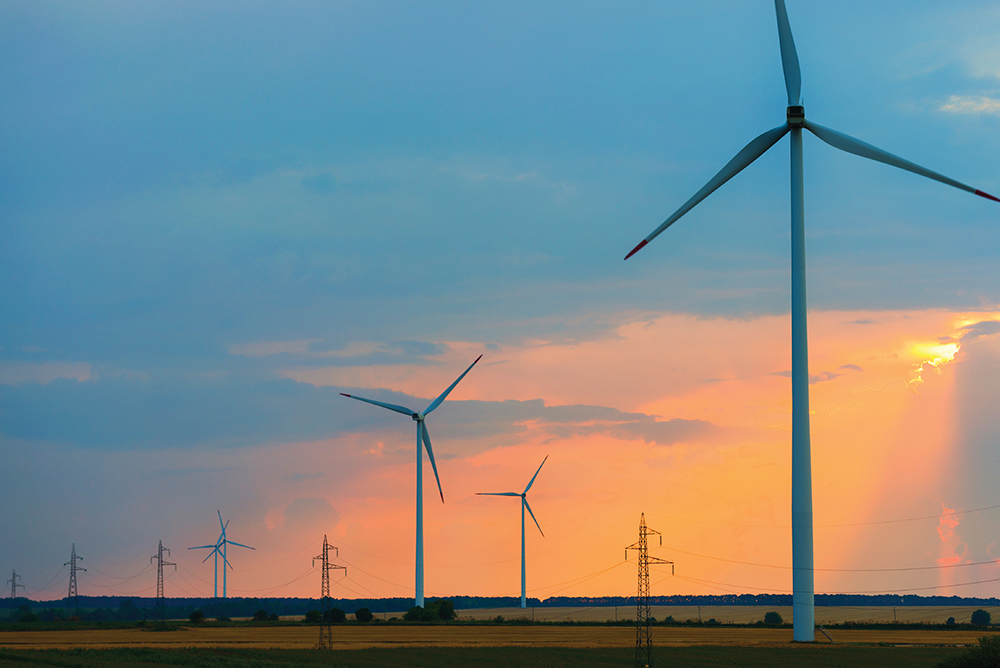
Groups are pushing multiple fronts in their fight against Big Oil, including: pressuring the presidential campaigns to address climate change and policies that promote solar and wind. (iStock)
A recent claim she made at a town hall in Ohio, where she said she would put coal miners out of work as president, showed her discomfort with the issue. Less than 24 hours after being lambasted by Republicans, coal-country lawmakers and industry representatives, Clinton backtracked and even sent a letter to Sen. Joe Manchin, a West Virginia Democrat who opposes policies targeting the coal communities in his state.
“Simply put, I was mistaken in my remarks,” Clinton said in her letter to Manchin. “I wanted to make the point that, as you know too well, while coal will be part of the energy mix for years to come, both in the U.S. and around the world, we have already seen a long-term decline in American coal jobs and a recent wave of bankruptcies as a result of a changing energy market — and we need to do more to support the workers and families facing these challenges.”
Clinton is in an “odd position,” said one strategist. Several groups, including the vocal 350.org, which was started by Sanders backer Bill McKibben, are “going to do everything they can to pull her to the left.”
But as candidates typically do, it’s likely she will move back to the center once the campaign cycle moves into the general election.
“I think she is an establishment Democrat,” the strategist said. “She has done enough to survive primaries,” but afterward it is a different story. “As soon as she can get through the primary … she wants to be in that moderate middle.
“I don’t think we will know anything about Clinton until after the election.”
Keep it in the ground
Environmental groups have intensified their efforts on the fossil fuel industry, ginning up new pressure on frackers, mining, offshore drilling and pipelines, and trying to get universities and pension funds to pull their investments in fossil fuel companies.
Last week, the group Environment America, in conjunction with 350.org, increased its fight against fracking by issuing an updated study on the environmental harm oil and natural gas fracking causes. The study was released shortly after the Sanders’ campaign started running ads supporting a nationwide ban on the practice.
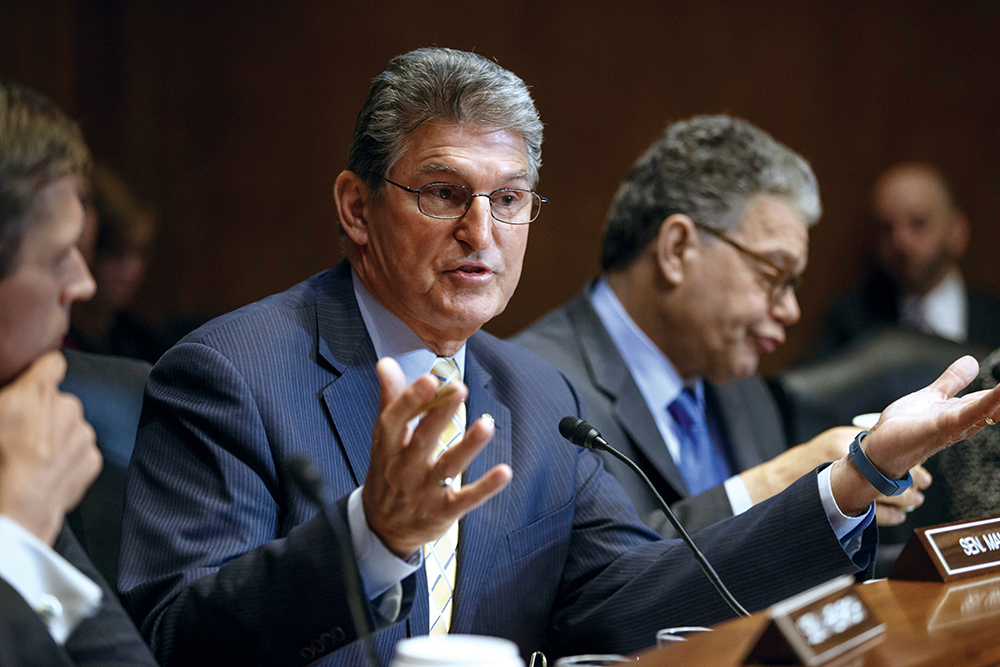
After being lambasted by Republicans, coal-country lawmakers and industry representatives for a comment about putting coal miners out of work as president, Hillary Clinton backtracked and even sent a letter to Sen. Joe Manchin, a West Virginia Democrat who opposes policies targeting the coal communities in his state. (AP Photo)
“For more than a decade, fracking has been a rolling environmental disaster, contaminating drinking water, marring landscapes, creating air and global warming pollution and even contributing to earthquakes,” Environment America said.
The report contains data from 24 states and seeks to document the number of toxic chemicals used in fracking, the water consumed in the process, and the amount of land disturbed over the last nine years of development. It also accounts for the amount of wastewater produced from oil and gas wells that are fracked, and the amount of methane gas produced in 2014, which the groups say is causing the Earth’s atmosphere to warm.
Many scientists blame greenhouse gases such as methane and carbon dioxide for causing global warming, leading to sea-level rise, glacial melting and more droughts and flooding.
After fracking comes coal mining and the administration’s moratorium on new coal leasing. The moratorium was put in place as the Interior Department devises a new accounting structure that considers the full environmental cost of coal, which is expected to make it more expensive to mine. The groups are prodding the agency to go further, urging the government to end all lease sales for new offshore drilling for oil and gas.
The “keep it in the ground” campaign is sparking animosity from the GOP, who see it as an affront to ailing oil, gas and coal regions that are suffering massive layoffs. Fracking states are enduring a global glut in the supply of oil, which has caused low prices that have made continuing operations un-economical. Coal country has been slammed by a downturn, as many utilities switch to natural gas to produce power and electricity consumption isn’t increasing.
Coal states understand the market challenges, but also cite federal environmental regulations as a culprit, which they characterize as the “War on Coal.”
Congressional Democrats are motivated by the anti-fossil fuel campaigns, introducing legislation that seeks to embed “keep it in the ground” in federal law. The bills effectively would ban the government from giving companies new leases for mining coal or drilling for oil and gas on federal lands. It also would stop new offshore drilling.
The Senate bill introduced in November by Sen. Jeff Merkley, D-Ore., has six co-sponsors, including Sanders. The House companion bill from California Democrat Rep. Jared Huffman has attracted 19 co-sponsors. But without Democratic control of the the House or Senate, it doesn’t look like the bills are going anywhere.
McKibben joined Huffman on a press release, saying his group and others will push for passage this Congress. “Anyone who does the math of climate change knows we need to keep most fossil fuel underground,” he said. “In a record hot world, let’s hope Congress acts on this at record speed. We will do all we can to make it happen.”
Meanwhile, the Sierra Club and others are upping their campaigns against the construction of infrastructure that supports oil and gas production, targeting pipelines.
The Sierra Club used a leak that spilled 17,000 gallons of oil in South Dakota this month as an example of why all oil and gas pipeline construction should be stopped. The leak was from the Keystone pipeline owned by TransCanada, which wanted Obama to approve its Keystone XL extension from Canada.
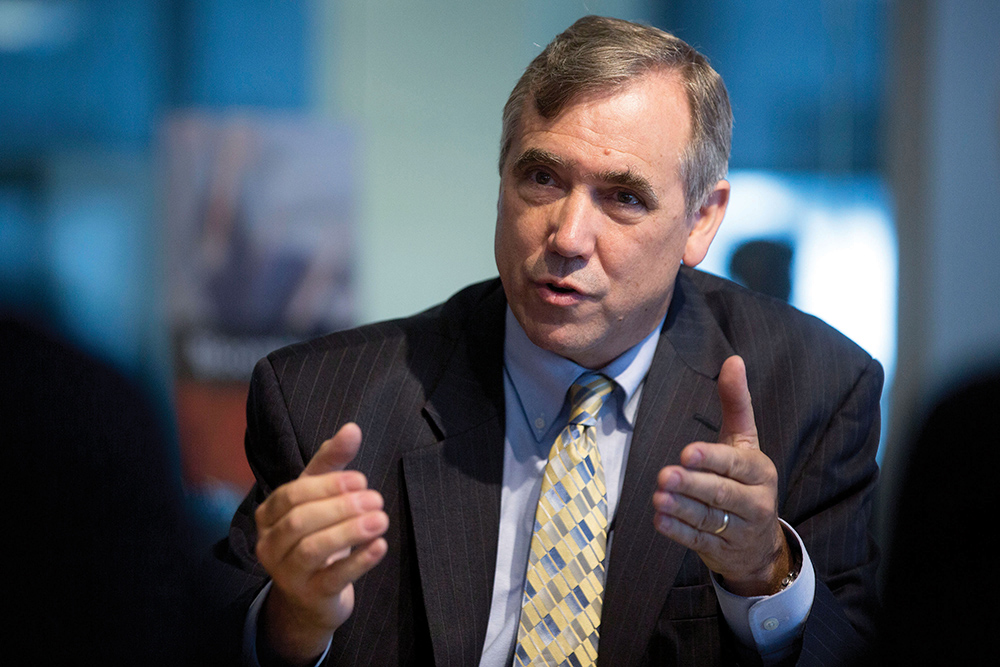
Congressional Democrats are motivated by the anti-fossil fuel campaigns, introducing legislation that seeks to embed “keep it in the ground” in federal law. The Senate bill introduced in November by Sen. Jeff Merkley, D-Ore., has six co-sponsors, including Sen. Bernie Sanders. (Bloomberg Photo)
Activists regularly visit the headquarters of the Federal Energy Regulatory Commission, the lead federal agency for pipeline permits, blocking commissioners from entering the building. The greens also are continuing to drive a wedge between states and large oil companies such as Exxon Mobil, with the latest move coming from attorneys general looking to expose the company’s reported coverup of the risks posed by global warming.
There also have been victories at the Securities and Exchange Commission, which recently directed Exxon Mobil to hold a shareholders’ vote on a resolution on the risk to investors posed by climate change.
Stephen Brown, vice president of federal affairs for large refiner Tesoro, warns the SEC victory could backfire on Democrats if a Republican is elected president.
It makes use of a federal agency — the SEC — to drive a partisan policy priority, he said. It’s a harmful precedent that a Republican administration would likely use against the Democrats.
“We look at the SEC as a double-edged sword,” Brown said.
See what sticks
“Generally, the environmentalists are very good at throwing things against the wall and seeing what sticks,” said Tom Pyle, president of the conservative group American Energy Alliance. “Some of it works. Some of it doesn’t.”
The groups reached “pay dirt” when Obama rejected the permit to build the Keystone XL pipeline last year, but that wasn’t a big lift, he said.
He says the keep it in the ground campaign is catchy and popular, but “it appeals to a narrow band” of voters. And while environmentalists are trying to up the ante on climate change, “they have never been able to move the needle on that stuff.”
Even a recent March Gallup poll that shows U.S. opposition to fracking has grown isn’t expected to have any effect on drilling, especially with prices at the pump remaining low.
Brown called environmental groups “very smart.” They keep coming out with new issues to advance their agenda “and get smarter each year.” On top of that, they aren’t afraid of losing, which is an advantage over an energy industry that is risk-averse.
Others say many of the activists’ campaigns are on the wane, especially the move to have banks, pensions, college endowments and hedge funds divest themselves from investments in the fossil fuel industry.
The “divestment …. movement is over,” said Matt Dempsey, managing director for energy and environment with FTI Consulting. “Now it’s trench warfare, which is not fun,” meaning environmental groups have to try to make their case in Senate and House fights, as well as the presidential races.
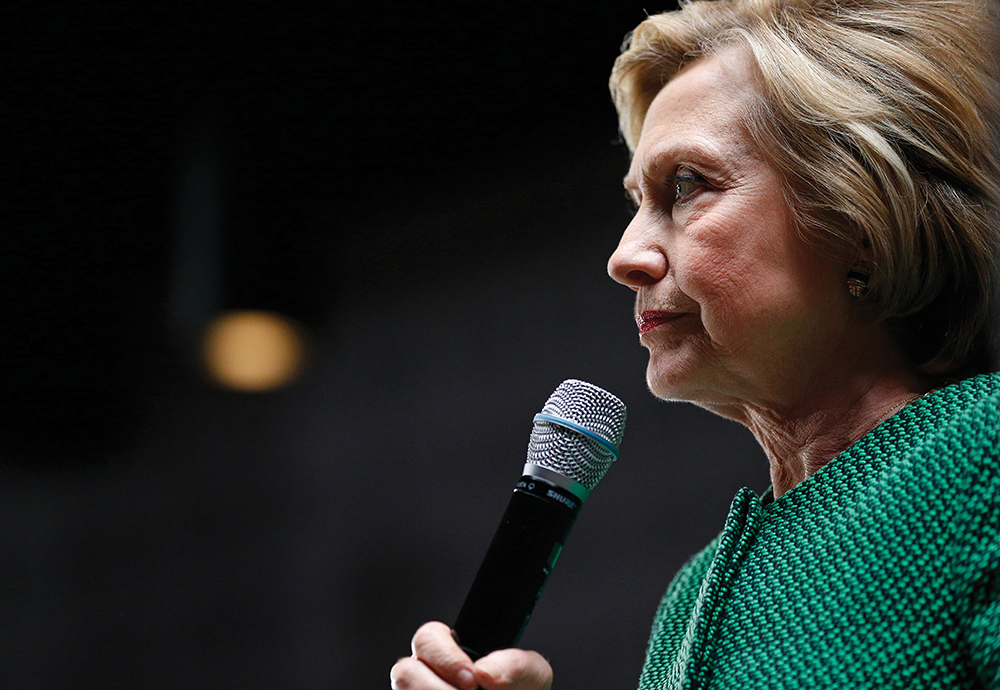
“I don’t think we will know anything about Clinton until after the election,” said one strategist, regarding her take on left-leaning environmental policies. (AP Photo)
Meanwhile, Senate Environmental and Public Works Committee Chairman Jim Inhofe, R-Okla., will continue his oversight role as much as possible during the presidential race, a committee spokeswoman said.
Inhofe started an investigation last year that attempted to show environmental groups colluding with the EPA in crafting the landmark Clean Power Plan, which the GOP opposes. The report didn’t go anywhere.
At the same time, the EPA refused to visit states that would be harmed by the rules the most. This administration “refused to go out to West Virginia” to hold a field hearing in a state that is near Washington, “yet they will take a call any day from the Natural Resources Defense Council,” said spokeswoman Donelle Harder.
The “collusion” helps demonstrate the theme of the administration. Obama is “more focused on his legacy than the will of the people,” Harder said.
Voters don’t care
Other critics of the activist strategy say the problem is that climate change isn’t high on voters’ list of priorities.
“Most people don’t care,” said Frank Maisano, energy specialist and senior principal with law firm Bracewell.
Polling on climate change shows it is a “low priority issue” for voters, and “it will remain a low priority issue,” he said. Energy issues become a campaign issue only when prices at the pump spike or there is some kind of crisis. But prices are low, and will remain so for the foreseeable future.
Brown said climate change is a good campaign issue when the economy is smooth. But it quickly goes by the wayside when voters are worried about their finances and will avoid anything that will cost them more money.
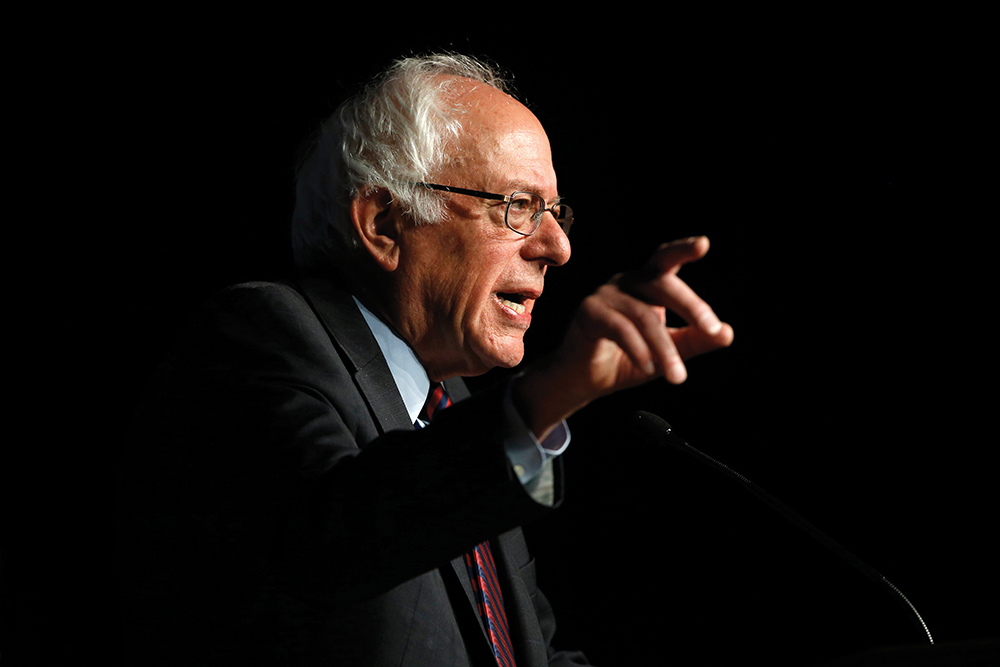
By far, the most desirable candidate for environmental groups is Vermont Sen. Bernie Sanders, who is a huge advocate for fighting climate change. (AP Photo)
People will complain about President Obama’s climate regulations, his crackdown on methane emissions and fracking, Maisano said, but how those issues play out in the elections will be highly regional, focused in states in coal country such as West Virginia and Kentucky, where the regulations are blamed for layoffs and economic collapse.
Environmentalists disagree.
“It’s how you ask the question,” Pica said.
“You see some of the voters … Certainly in Michigan, voters are concerned about clean water,” he said. “From the climate change perspective … will we see this excitement on the Republican side? No,” he says. But young Republicans “see an existential threat” from climate change, and the Republican Party “is out of touch” on the issue.
Climate Not Everything
Another problem for environmentalists is that their competing views are starting to slam up against each other.
A situation that occurred at the liberal think tank Center for American Progress demonstrates that point. The center, which was started by Clinton’s campaign manager John Podesta, was having a panel discussion with Steyer on climate change and the Democratic governor of Pennsylvania. To their surprise, a rival environmental groups showed up to protest the event, bringing it to an abrupt close.
“Climate leaders don’t frack,” the activists chanted over and over, forcing Center for American Progress Director Neena Tanden to wrap things up early. The environmentalists were protesting Pennsylvania Gov. Tom Wolf for not opposing fracking. The process, which is keeping natural gas and crude oil relatively cheap, is used in Pennsylvania and other states to extract gas and oil from shale rock deep underground.
GOP strategists at the event say the interruption was telling. It showed that the far-left environmentalists are going after the moderates who other activists such as Steyer support.
The protesters appeared to be part of a campaign started by the group Center for Biological Diversity to point out the hypocrisy of state officials who support taking climate action but back natural gas development from shale. Target No. 1 was Wolf, but the campaign was borne from statements made by California Gov. Jerry Brown, a Democrat that some in the environmental camp deemed as too moderate on climate change when he came out in support of fracking.
The incident may be indicative of a more aggressive tack seen by activists on the campaign trail. A Greenpeace activist confronted Clinton late last month about funding she received from fossil fuel interests, asking her to pledge to reject it in the future. A Greenpeace report on Clinton’s super PAC funding shows she received nearly $1.5 million from fossil fuel lobbyists.
“I am so sick of the Sanders campaign lying about me,” Clinton said. “I am sick of it,” she said, jabbing her finger at the activist.

Environmental groups say the fight to drive out fossil fuels needs to ensure that policies that would keep oil and coal in the ground are pushed in 2017. (iStock)
Greenpeace posted the heated exchange on its website, trying to clarify that it was not acting on behalf of Sanders. Eva Resnick-Day, the activist in the video, said her actions were part of a campaign Greenpeace started to get all presidential candidates to sign a pledge “to reject future fossil fuel contributions, champion campaign finance reform and defend the right to vote for all.” She said Sanders signed the pledge immediately. Hillary’s campaign responded, but did not sign.
“That level of coziness makes voters like me who care about climate change uncomfortable,” Resnick-Day said.
Playing the Trump card
Environmental groups are still in a state of shock over GOP front-runner Donald Trump, and are mulling when and how to step in to the presidential race.
Some of the more established groups such as the Natural Resources Defense Council have been cautious during the raucous primary season. The NRDC has not endorsed a candidate, yet.
Nevertheless, a spokesman for the influential group says its political arm, NRDC Action Fund, for the first time will endorse candidates. It also will increase the level of work it is allowed to do as a nonprofit to support candidates in the congressional and presidential races.
NRDC Action appears to be biding its time by focusing on getting Democrats elected in House and Senate races.
But for groups already committed to the race, Trump is seen as threatening for both energy groups and environmentalists.
“Trump is dangerous,” Pica said.
“I think the political establishment underestimated Trump at its own peril. He will be extremely damaging on the EPA in fighting climate change. He is at the extreme on most issues.”
Trump is making the fossil fuel industry nervous, said Tesoro’s Brown. He said refiners fear he could cause a strong backlash and drive more voters into the arms of Democrats. And another Clinton White House is something the energy industry wants to avoid.
“We are looking at a Clinton White House and Democratic Senate, and God forbid a Democratic House … if Trump is the nominee,” Brown said.
